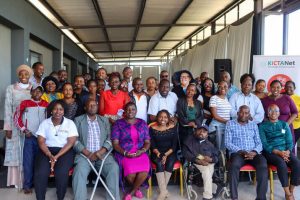Goodmorning Keith,
Many thanks for starting this timely conversation. Yesterday i came across
rumours in the blogosphere regarding the appointment of the Data
Commissioner. Clearly Data will play a key role in this decade in our
Social and Economic Spheres. We are seeing a way of life ‘working from
home’, ‘Online learning’, ‘e-health’, ‘e-agriculture’ which will all be
dependent on data. While contemplating how to respond to this discussion i
kept asking myself whether we have or there is a need for a common
definition of Data across all stakeholder groups. This could be a starting
point that will make life easier for the Data Commissioner and all
Stakeholder groups as a whole. Once we have a Common understanding, it will
be easy to define our roles and responsibilities and use cases. We will
also be able to define our Capacity building needs.
I will be back with more.
On Wed, Oct 14, 2020 at 7:36 AM Keith Andere via kictanet <
[email protected]> wrote:
> Dear Listers,
>
>
>
> I trust you are all having a great week. As you are aware this year
> Kenya’s 2020 IGF will be one of a kind as it will be our first ever virtual
> KIGF. It will be taking place on 29th October and as part of the build up
> to this major event, we shall be having moderated 3-day online discussions
> on this year’s KIGF theme.
>
>
>
> These discussions will allow us to not only learn some few things but also
> designed to allow us to dig deeper into a range of topics and ultimately
> apply those concepts on the Big Day!
>
>
>
> This year’s first sub theme is Data. The Data track will provide for
> discussions on the fundamental challenge of ensuring the benefits of the
> data revolution to contribute to inclusive economic development while
> protecting the rights of people. Under this topic there are also matters to
> do with digital identity, data and jurisdiction, data driven emerging
> technologies, data access, quality, innovation and competition. To this
> end, I invite your contributions to the following questions:
>
>
> 1. What are/should be the rights and responsibilities for
> individuals in determining the use of their personal data? How to ensure
> transparency and accountability in the gathering and handling of personal
> data?
>
> 2. What societal and economic benefits are enabled by the
> trustworthy use of data to develop data-driven emerging technologies?
>
> 3. To what extent, if any, could the development of international
> norms and principles facilitate common approaches and interoperability of
> data protection frameworks, and also facilitate international trade and
> cooperation?
>
> 4. What is the impact of AI and other data-driven technologies in
> the exercise of rights of most vulnerable groups? How to implement them to
> further advance their inclusion and avoid further harm?
>
> 5. How can we ensure equitable access to data for fostering
> competition and innovation?
>
> Karibuni Mjadala.
>
> Regards
> Keith
>
> —
> Keith Andere
> Internet Governance | Policy | Cyber Peace & Security | Sustainable
> Development
> W: wa.me/+254722565212 <wa.me/254722565212>
> E: [email protected] / [email protected]
> Twitter: @AndereKE
> Skype: Keithess
> LinkedIn <www.linkedin.com>
> [image: linkedin icon] <www.linkedin.com/ke/andereke> [image:
> twitter icon]
> *Please consider the data privacy and confidentiality of this e-mail or
> it’s contents.*
>
> _______________________________________________
> kictanet mailing list
> [email protected]
> lists.kictanet.or.ke/mailman/listinfo/kictanet
> Twitter: http://twitter.com/kictanet
> Facebook: www.facebook.com/KICTANet/
>
> Unsubscribe or change your options at
> lists.kictanet.or.ke/mailman/options/kictanet/otieno.barrack%40gmail.com
>
> The Kenya ICT Action Network (KICTANet) is a multi-stakeholder platform
> for people and institutions interested and involved in ICT policy and
> regulation. The network aims to act as a catalyst for reform in the ICT
> sector in support of the national aim of ICT enabled growth and development.
>
> KICTANetiquette : Adhere to the same standards of acceptable behaviors
> online that you follow in real life: respect people’s times and bandwidth,
> share knowledge, don’t flame or abuse or personalize, respect privacy, do
> not spam, do not market your wares or qualifications.
>



